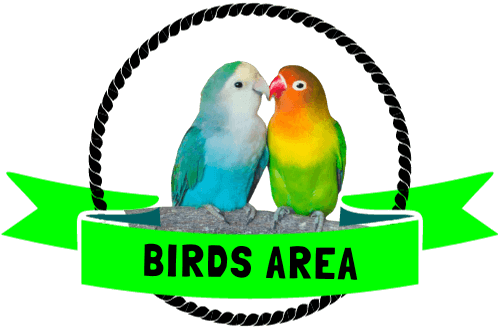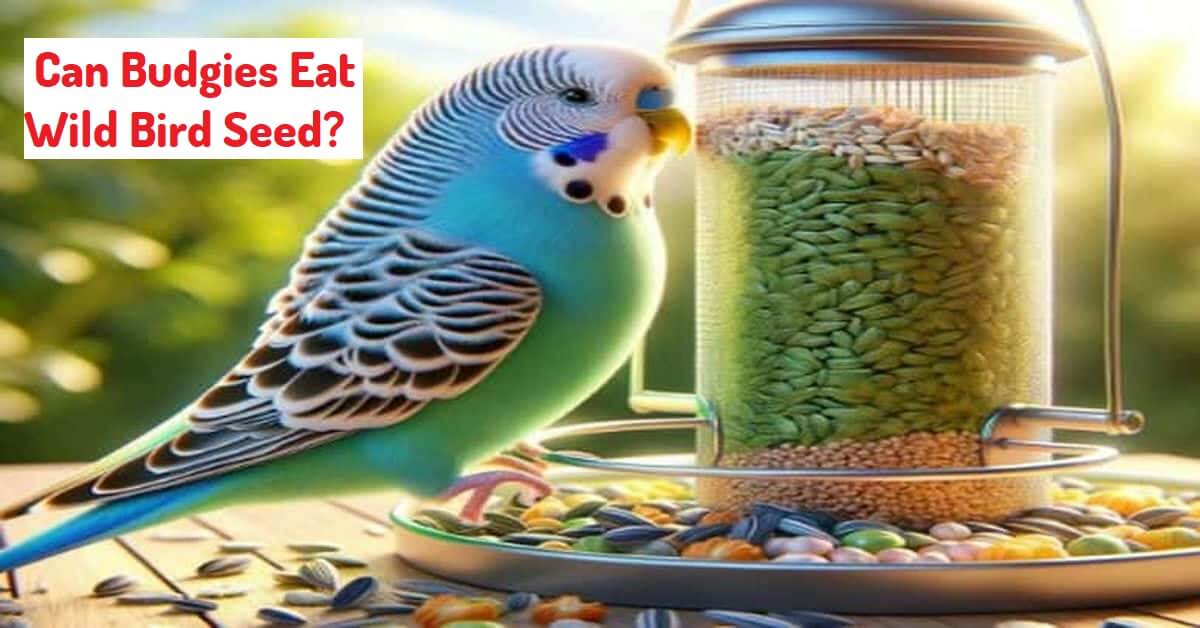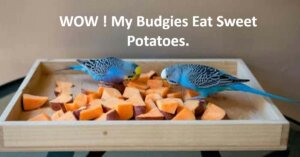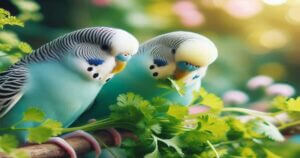Can Budgies Safely Eat Wild Bird Seed? Find Out Now
Are you a budgie parent wondering how to mix up their meals? A big question is: “Can budgies eat wild bird seed?”
The short answer is yes, budgies can have wild bird seed. But, it’s not the best choice for their everyday menu.
However, in this article, I’ve dug into the pros and cons of adding wild bird seed to your budgie’s diet. I’m here to give you all the facts, so you can make the best choice for your colorful little friend’s health and happiness.
Can Budgies Eat Wild Bird Seed Truly?

Budgies, you know, those little, bright birds? They’re awesome pets from Australia. They love company and are super friendly. Just like us, they need good food to stay fit and chirpy.
So, what should you feed them? There are loads of options – special budgie seeds, fresh fruits and veggies, and now and then, a treat. But here’s a big question: Can budgies munch on wild birdseed? A lot of bird owners wonder about this.
Here’s the scoop: it’s not a great idea to make wild birdseed their main meal. It’s usually meant for bigger birds and can be a bit tough on a budgie’s tummy. Some of these seeds, like sunflower seeds, are pretty fatty. Too much of that, and your budgie might get chubby and run into health issues.
Another thing – wild bird seed can sometimes have nasty stuff like bacteria, mold, or bugs that can make your budgie unwell. Remember, budgies need a diet that’s just right for them.
If you’re thinking of giving your budgie some wild bird seed, just do it once in a while as a little extra. Make sure it’s fresh and clean. And hey, it’s always smart to have a chat with your vet or a bird expert before changing what your budgie eats.
In short, keep your budgie’s meals healthy and balanced. Stick to top-notch budgie seed mixes and mix in some fresh fruit and veggies. This way, you’ll have a happy, healthy feathered buddy.
Composition Of Wild Bird Seed
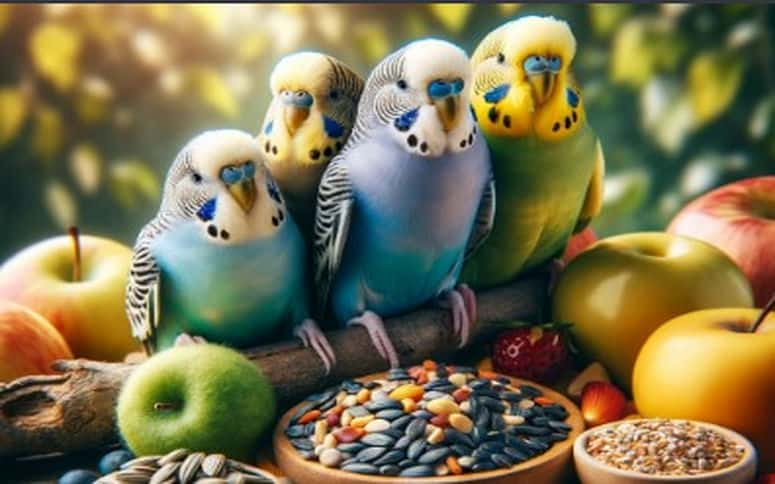
Some common ingredients found in wild bird seed include:
- Sunflower seeds: These are packed with healthy fats and proteins, making them a popular choice for birds.
- Millet: This small, round grain is rich in carbohydrates and can provide a good source of energy for birds.
- Cracked corn: Another carbohydrate-rich ingredient, cracked corn is often included in birdseed mixes.
- Nyjer seeds: These small, black seeds are a favorite among finches and contain high levels of oil and protein.
- Safflower seeds: Safflower seeds are known for their high oil content and are often enjoyed by larger birds.
While these ingredients are beneficial for wild birds, should budgies be offered the same mix? Let’s check the pros and cons of including wild bird seed.
Balancing Budgie Diets: The Pros and Cons of Including Wild Bird Seed

Wild bird seed is this mix of different seeds and grains that folks usually use to bring all sorts of wild birds to their feeders. While your budgie mainly needs fresh fruits, veggies, and the right kind of bird seed from the pet shop, a bit of wild bird seed now and then might actually be good for them. Let’s check out why:
The Plus Side
- Something Different: A little wild bird seed can spice up your budgie’s menu, and that’s great for their mood.
- Acting Natural: Budgies are busy little explorers. Getting to peck around in some wild bird seed is fun for them and keeps their brain busy.
- Healthy Fats: Seeds like sunflower seeds in the wild bird mix have good fats that help keep your budgie healthy.
But, Be Careful
However, it’s not all sunshine and seeds. There are a few things to watch out for:
- Lack of essential vitamins and minerals: Wild bird seed may not contain all the essential vitamins and minerals that budgies need to maintain optimal health. This can lead to nutrient deficiencies over time.
- High fat content: Some seeds in wild bird seed mixes, like sunflower seeds, can be high in fat. While budgies need some fat in their diet, excessive fat consumption can lead to weight gain and health issues.
- Ingestion of harmful additives: Wild bird seed mixes often contain additives or preservatives that are safe for wild birds but may not be suitable for budgies. These additives can cause digestive problems or allergic reactions in budgies.
In a Nutshell: Giving your budgie a bit of wild bird seed can have its benefits, but you’ve got to be smart about it. It’s all about balance – don’t let it take over their main diet of fruits, veggies, and their special budgie seed mix. A little bit every now and then should be just fine.
Recommended Diets For Budgies

Discover the recommended diets for budgies and find out if they can safely consume wild bird seed like flaxseeds. Ensure your feathered friend’s nutritional needs are met with expert guidance.
Seeds the Budgie Superfood For Budgie Nutrition
When it comes to feeding budgies, think of seeds first. Millet seeds are a big hit. They’re not just tasty; they’re full of proteins, fibers, and vitamins like E and B.
Imagine giving your budgie about 10 grams of millet seeds daily. It’s their energy booster! Next up are sunflower seeds. They’re like the treats of the bird world, rich in healthy fats and protein.
But remember, moderation is key – a couple of grams per day is plenty. And then, there are flaxseeds, tiny but powerful. They’re full of omega-3 fats, great for your budgie’s feathers and skin.
A gram or two mixed in their daily seed portion works wonders.
Supplementary Foods For A Healthy Diet
Seeds are awesome, but let’s add some color with fruits and veggies. Fruits like apples, pears, and berries add a splash of antioxidants and vitamins to their diet. Think of giving your budgie a small piece of fruit daily.
Leafy greens? Yes, please, Spinach, arugula, and lettuce are great for vitamins and minerals. A few leaves a week will do. And veggies like carrots and bell peppers? ( I have a detailed article about can budgie eat bell peppers)
They’re not just tasty; they pack a punch with fiber and nutrients. A couple of small pieces a week will make your budgie’s meal a feast.
So, mix it up with seeds, fruits, and veggies to keep your budgie healthy and happy. Every bird has its favorites, so watch what they love and mix their diet accordingly. Happy feeding
How to Feed budgies With Wild Bird Food Seeds?
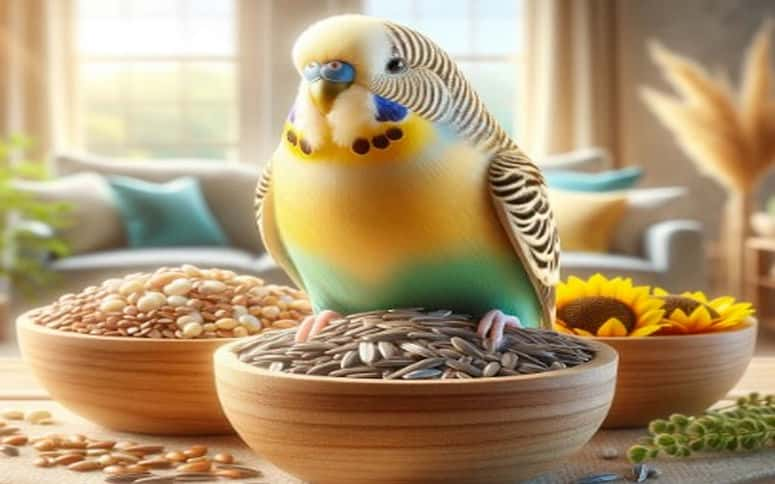
As someone who’s had budgies for a while, I’ve learned quite a bit about their feeding habits, particularly when it comes to including wild bird food seeds. It’s crucial to remember that these seeds are just a special bonus, not the staple of their diet. My budgies thrive on a diverse mix of regular seeds, along with fresh fruits and veggies.
When I decide to add wild bird seeds to their meals, I’m always careful with the quantity. This is about adding a little excitement and encouraging their natural foraging instincts, which is super important for their mental health.
Here’s what I do: I sprinkle just a teaspoon of wild bird seeds over their usual seed mix. This helps ensure that my budgies don’t go overboard on the wild seeds and miss out on the essential nutrients they need. Selecting the appropriate type of wild bird seed is crucial. I avoid fatty seeds like sunflower seeds.
Instead, I opt for a more budgie-friendly mix, such as a blend of millet, canary grass seeds, and a few sesame seeds. Making sure these seeds are fresh and free from any mold or contaminants is important, as I want to avoid any health issues for my birds.
Moreover, this small addition has made feeding times more enjoyable for my budgies. They love exploring their food, mimicking their natural behavior in the wild. It’s delightful watching them pick through and discover different seeds.
In summary, using wild bird seeds as a supplementary treat in moderation, mixed with their regular food, adds excitement to their meals and benefits their mental well-being. It’s about balance and ensuring they get proper nutrition while enjoying a bit of variety.
Frequently Asked Questions For Can Budgies Eat Wild Bird Seed
Is it safe to give budgies wild bird seed?
What should be the main component of a budgie’s diet?
How often should I feed my budgie fresh food?
How much food should I give my budgie each day?
How can I encourage my budgie to try new foods?
What foods are toxic to budgies?
To Sum Up
Before you start giving them wild bird seeds, there’s stuff to think about. Budgies can have these seeds, but only a little bit. They shouldn’t stop eating their usual pellets and the fresh fruits and veggies they love.
Make sure the seeds you give your budgie are just right for them. This helps them stay healthy and get all the nutrients they need. It’s a good idea to chat with a vet or a bird food expert. They can give you great advice on what to feed your budgie.
Each budgie is different. Some might like certain foods more than others. Watch what your budgie likes and check how they’re doing. This way, you can make sure they’re happy and healthy.
